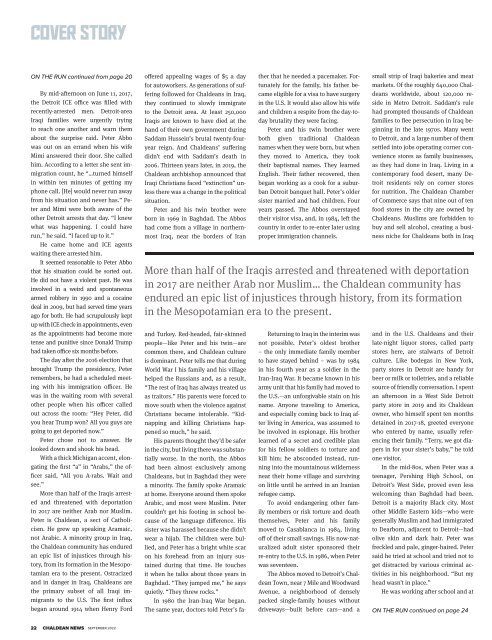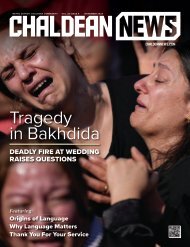You also want an ePaper? Increase the reach of your titles
YUMPU automatically turns print PDFs into web optimized ePapers that Google loves.
COVER STORY<br />
ON THE RUN continued from page 20<br />
By mid-afternoon on June 11, 2017,<br />
the Detroit ICE office was filled with<br />
recently-arrested men. Detroit-area<br />
Iraqi families were urgently trying<br />
to reach one another and warn them<br />
about the surprise raid. Peter Abbo<br />
was out on an errand when his wife<br />
Mimi answered their door. She called<br />
him. According to a letter she sent immigration<br />
count, he “…turned himself<br />
in within ten minutes of getting my<br />
phone call. [He] would never run away<br />
from his situation and never has.” Peter<br />
and Mimi were both aware of the<br />
other Detroit arrests that day. “I knew<br />
what was happening. I could have<br />
run,” he said. “I faced up to it.”<br />
He came home and ICE agents<br />
waiting there arrested him.<br />
It seemed reasonable to Peter Abbo<br />
that his situation could be sorted out.<br />
He did not have a violent past. He was<br />
involved in a weird and spontaneous<br />
armed robbery in 1990 and a cocaine<br />
deal in 2009, but had served time years<br />
ago for both. He had scrupulously kept<br />
up with ICE check-in appointments, even<br />
as the appointments had become more<br />
tense and punitive since Donald Trump<br />
had taken office six months before.<br />
The day after the 2016 election that<br />
brought Trump the presidency, Peter<br />
remembers, he had a scheduled meeting<br />
with his immigration officer. He<br />
was in the waiting room with several<br />
other people when his officer called<br />
out across the room: “Hey Peter, did<br />
you hear Trump won? All you guys are<br />
going to get deported now.”<br />
Peter chose not to answer. He<br />
looked down and shook his head.<br />
With a thick Michigan accent, elongating<br />
the first “a” in “Arabs,” the officer<br />
said, “All you A-rabs. Wait and<br />
see.”<br />
More than half of the Iraqis arrested<br />
and threatened with deportation<br />
in 2017 are neither Arab nor Muslim.<br />
Peter is Chaldean, a sect of Catholicism.<br />
He grew up speaking Aramaic,<br />
not Arabic. A minority group in Iraq,<br />
the Chaldean community has endured<br />
an epic list of injustices through history,<br />
from its formation in the Mesopotamian<br />
era to the present. Ostracized<br />
and in danger in Iraq, Chaldeans are<br />
the primary subset of all Iraqi immigrants<br />
to the U.S. The first influx<br />
began around 1914 when Henry Ford<br />
offered appealing wages of $5 a day<br />
for autoworkers. As generations of suffering<br />
followed for Chaldeans in Iraq,<br />
they continued to slowly immigrate<br />
to the Detroit area. At least 250,000<br />
Iraqis are known to have died at the<br />
hand of their own government during<br />
Saddam Hussein’s brutal twenty-fouryear<br />
reign. And Chaldeans’ suffering<br />
didn’t end with Saddam’s death in<br />
2006. Thirteen years later, in 2019, the<br />
Chaldean archbishop announced that<br />
Iraqi Christians faced “extinction” unless<br />
there was a change in the political<br />
situation.<br />
Peter and his twin brother were<br />
born in 1969 in Baghdad. The Abbos<br />
had come from a village in northernmost<br />
Iraq, near the borders of Iran<br />
and Turkey. Red-headed, fair-skinned<br />
people—like Peter and his twin—are<br />
common there, and Chaldean culture<br />
is dominant. Peter tells me that during<br />
World War I his family and his village<br />
helped the Russians and, as a result,<br />
“The rest of Iraq has always treated us<br />
as traitors.” His parents were forced to<br />
move south when the violence against<br />
Christians became intolerable. “Kidnapping<br />
and killing Christians happened<br />
so much,” he said.<br />
His parents thought they’d be safer<br />
in the city, but living there was substantially<br />
worse. In the north, the Abbos<br />
had been almost exclusively among<br />
Chaldeans, but in Baghdad they were<br />
a minority. The family spoke Aramaic<br />
at home. Everyone around them spoke<br />
Arabic, and most were Muslim. Peter<br />
couldn’t get his footing in school because<br />
of the language difference. His<br />
sister was harassed because she didn’t<br />
wear a hijab. The children were bullied,<br />
and Peter has a bright white scar<br />
on his forehead from an injury sustained<br />
during that time. He touches<br />
it when he talks about those years in<br />
Baghdad. “They jumped me,” he says<br />
quietly. “They threw rocks.”<br />
In 1980 the Iran-Iraq War began.<br />
The same year, doctors told Peter’s father<br />
that he needed a pacemaker. Fortunately<br />
for the family, his father became<br />
eligible for a visa to have surgery<br />
in the U.S. It would also allow his wife<br />
and children a respite from the day-today<br />
brutality they were facing.<br />
Peter and his twin brother were<br />
both given traditional Chaldean<br />
names when they were born, but when<br />
they moved to America, they took<br />
their baptismal names. They learned<br />
English. Their father recovered, then<br />
began working as a cook for a suburban<br />
Detroit banquet hall. Peter’s older<br />
sister married and had children. Four<br />
years passed. The Abbos overstayed<br />
their visitor visa, and, in 1984, left the<br />
country in order to re-enter later using<br />
proper immigration channels.<br />
Returning to Iraq in the interim was<br />
not possible. Peter’s oldest brother<br />
– the only immediate family member<br />
to have stayed behind – was by 1984<br />
in his fourth year as a soldier in the<br />
Iran-Iraq War. It became known in his<br />
army unit that his family had moved to<br />
the U.S.—an unforgivable stain on his<br />
name. Anyone traveling to America,<br />
and especially coming back to Iraq after<br />
living in America, was assumed to<br />
be involved in espionage. His brother<br />
learned of a secret and credible plan<br />
for his fellow soldiers to torture and<br />
kill him; he absconded instead, running<br />
into the mountainous wilderness<br />
near their home village and surviving<br />
on little until he arrived in an Iranian<br />
refugee camp.<br />
To avoid endangering other family<br />
members or risk torture and death<br />
themselves, Peter and his family<br />
moved to Casablanca in 1984, living<br />
off of their small savings. His now-naturalized<br />
adult sister sponsored their<br />
re-entry to the U.S. in 1986, when Peter<br />
was seventeen.<br />
The Abbos moved to Detroit’s Chaldean<br />
Town, near 7 Mile and Woodward<br />
Avenue, a neighborhood of densely<br />
packed single-family houses without<br />
driveways—built before cars—and a<br />
small strip of Iraqi bakeries and meat<br />
markets. Of the roughly 640,000 Chaldeans<br />
worldwide, about 120,000 reside<br />
in Metro Detroit. Saddam’s rule<br />
had prompted thousands of Chaldean<br />
families to flee persecution in Iraq beginning<br />
in the late 1970s. Many went<br />
to Detroit, and a large number of them<br />
settled into jobs operating corner convenience<br />
stores as family businesses,<br />
as they had done in Iraq. Living in a<br />
contemporary food desert, many Detroit<br />
residents rely on corner stores<br />
for nutrition. The Chaldean Chamber<br />
of Commerce says that nine out of ten<br />
food stores in the city are owned by<br />
Chaldeans. Muslims are forbidden to<br />
buy and sell alcohol, creating a business<br />
niche for Chaldeans both in Iraq<br />
More than half of the Iraqis arrested and threatened with deportation<br />
in 2017 are neither Arab nor Muslim… the Chaldean community has<br />
endured an epic list of injustices through history, from its formation<br />
in the Mesopotamian era to the present.<br />
and in the U.S. Chaldeans and their<br />
late-night liquor stores, called party<br />
stores here, are stalwarts of Detroit<br />
culture. Like bodegas in New York,<br />
party stores in Detroit are handy for<br />
beer or milk or toiletries, and a reliable<br />
source of friendly conversation. I spent<br />
an afternoon in a West Side Detroit<br />
party store in 2019 and its Chaldean<br />
owner, who himself spent ten months<br />
detained in 2017-18, greeted everyone<br />
who entered by name, usually referencing<br />
their family. “Terry, we got diapers<br />
in for your sister’s baby,” he told<br />
one visitor.<br />
In the mid-80s, when Peter was a<br />
teenager, Pershing High School, on<br />
Detroit’s West Side, proved even less<br />
welcoming than Baghdad had been.<br />
Detroit is a majority Black city. Most<br />
other Middle Eastern kids—who were<br />
generally Muslim and had immigrated<br />
to Dearborn, adjacent to Detroit—had<br />
olive skin and dark hair. Peter was<br />
freckled and pale, ginger-haired. Peter<br />
said he tried at school and tried not to<br />
get distracted by various criminal activities<br />
in his neighborhood. “But my<br />
head wasn’t in place.”<br />
He was working after school and at<br />
ON THE RUN continued on page 24<br />
22 CHALDEAN NEWS <strong>SEPTEMBER</strong> <strong>2022</strong>

















